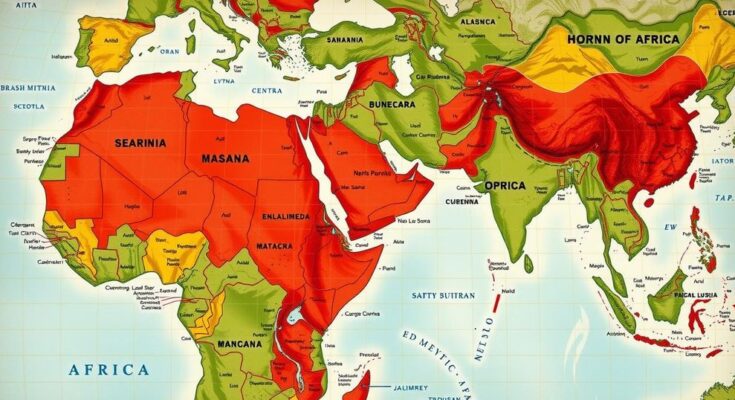The leaders of Egypt, Eritrea, and Somalia convened in Asmara to pledge cooperation on regional security amid rising tensions in the Horn of Africa. Concerns surrounding Sudan’s unrest and Ethiopia’s maritime deal with Somaliland were central to their discussions. The summit concluded with commitments to bolster ties and address Somalia’s challenges against terrorism and external threats.
In an unprecedented summit held in Asmara, the leaders of Egypt, Eritrea, and Somalia pledged collaboration on regional security amidst escalating tensions in the Horn of Africa. This summit addressed critical concerns including the ongoing conflict in Sudan, the contentious maritime agreement between Ethiopia and Somaliland, and recent hostilities in the Red Sea involving Yemen’s Houthi rebels. This newly formed alliance notably excludes Ethiopia, heightening existing tensions.
Eritrean President Isaias Afwerki hosted Egyptian President Abdel Fattah al-Sisi and Somali President Hassan Sheikh Mohamud, focusing on the need to respect the sovereignty of regional nations and coordinate efforts for stability and development. The leaders specifically vowed to strengthen cooperation to aid Somalia in addressing both internal and external threats, emphasizing the importance of empowering the Somali National Federal Army to combat terrorism effectively.
During the discussions, the leaders addressed the precarious situation in Sudan and agreed to establish a trilateral committee consisting of foreign ministers aimed at fostering strategic cooperation across multiple sectors. Notably, this summit marked President Sisi’s first visit to Eritrea, symbolizing a significant diplomatic engagement, further compounded by Somalia’s military agreement with Egypt to counter Al-Shabaab insurgents.
The backdrop of this summit included Ethiopia’s recent conflicts with Somalia over the Somaliland deal and its deteriorating relations with Eritrea, despite previous military collaboration. Although Ethiopian officials described relations with Eritrea as “peaceful,” recent events underscore a period of heightened tensions, including Ethiopia’s suspension of flights to Eritrea. This summit initiated a potential shift in alliances in the Horn of Africa, wherein Egypt, Eritrea, and Somalia may find common ground against rising threats from Ethiopia and its newfound partnership with Somaliland.
The Horn of Africa is characterized by a complex web of geopolitical tensions, particularly involving Egypt, Eritrea, and Somalia. Recent developments, including the civil unrest in Sudan and Ethiopia’s controversial deal with Somaliland for naval access, have deepened regional insecurities. The ongoing conflict with the Al-Shabaab jihadist group and the critical water issues surrounding the Grand Ethiopian Renaissance Dam have further stimulated Egypt’s alignment with Somalia, aiming to counter Ethiopia’s expanding influence. Eritrea, historically at odds with Ethiopia due to territorial disputes, is similarly motivated to bolster its alliances given recent diplomatic strains.
The summit in Asmara represents a pivotal moment for Egypt, Eritrea, and Somalia as they seek to unify against perceived threats in the Horn of Africa. By emphasizing mutual respect for sovereignty and enhancing military cooperation, these nations are positioning themselves to confront security challenges collectively. The exclusion of Ethiopia from this alliance may escalate existing tensions, pointing to a potentially significant shift in the region’s geopolitical landscape.
Original Source: www.barrons.com




